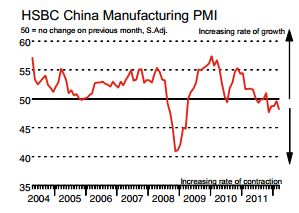European markets will lead global influences again on four main counts. First, German releases could be the most important development in the eurozone as consensus expects each of factory orders, industrial production and exports to take a step backward from solid gains the prior month. If correct, then that would stoke renewed fears about the ability of the German economy to remain resilient in the face of heightened weakness in several of its key export markets including China, the rest of the eurozone, and the US (where the economy is running at stall speed excluding the auto sector).
Second, seemingly daily polls out of Greece will whipsaw markets around right up until the results of the June 17th elections are announced. Third, consensus and markets expect the ECB to remain on hold, and likewise for the Bank of England. In the middle of these releases, Germany conducts a 5- year bond auction, but the fourth most important development could well be a planned Spanish auction on Thursday. Additional data risk will be posed by eurozone retail sales whereby next week’s print could drive negative spending growth in year-over-year terms, eurozone GDP revisions, and French jobs.
Euro Dollar:
EURUSD (1.24.35) The dollar fell against the euro and yen on Friday after a gloomy U.S. jobs report fueled talk the Federal Reserve may need to take further monetary easing measures to prop up the fragile economy. The euro rebounded off a 23-month low against the dollar as traders scrambled to cover bets against the euro zone common currency after driving it down 7 percent in May. Sharp losses for the greenback ensued after Washington reported U.S. employers created a paltry 69,000 jobs last month. It was the fewest since May last year, and the unemployment rate rose for the first time since June. The data added to a slew of recent weak numbers suggesting the economic recovery was faltering.
While potential remedies for Europe’s credit crisis might be proposed over the calm of the weekend, investors will navigate monetary policy decisions from the European Central Bank, Bank of England, Reserve Bank of Australia and testimony from U.S. Federal Reserve Chairman Ben Bernanke before the U.S. Congress.
The euro traded up 0.40 percent to $1.2406, rebounding from a session low of $1.2286, the weakest since July 1, 2010. It had climbed as high as $1.2456 on Reuter’s data, helped by market talk of coordinated monetary easing by the G20 over the weekend.
The Great British Pound
GBPUSD (1.5363) Sterling fell to its lowest in more than four months against the dollar on Friday as worries about Spain’s finances drove investors towards safer assets and ahead of a survey that is expected to show UK manufacturing activity contracted in May.
The UK purchasing managers’ index, due at 0828 GMT, is expected to drop to 49.8 from 50.5 the previous month, taking it below the 50 mark that separates growth from expansion.
After data last week showed the UK economy shrank more than estimated in the first quarter, further indications of weakness are likely to fuel speculation the Bank of England will revive its asset buying, or quantitative easing (QE), programme.
This would put further pressure on the pound, analysts said.
Sterling fell 0.3 percent on the day to $1.5341, its weakest since mid-January. Further losses would see it heading towards the early January low of $1.5234., its lowest since November 2008.
Asian –Pacific Currency
USDJPY (78.01) The Japanese government went on high alert against the newly rising yen Friday, trying to scare off global investors with multiple threats of intervention in currency markets, but stopping short of direct action to drive the yen down.
A number of fresh signs of economic weakness from around the world over the past week have boosted the yen against the dollar and the euro, as investors have poured money into what is considered one of the globe’s few remaining safe-haven assets.
After a surprisingly weak U.S. jobs report Friday morning pushed the dollar below ¥78 for the first time in months, word spread in currency markets that the Bank of Japan was calling financial institutions to ask the latest dollar/yen price, a move often seen as a sign the central bank was mulling buying dollars on behalf of the government to prop up the price of the greenback.
While traders say no purchases took place, the reports pushed the dollar back up above the ¥78 level.
Japanese officials and business executives have complained that the yen’s rise against the dollar and euro is raising the price of Japanese-made goods in world markets, crimping exports and threatening to undermine a tentative economic recovery from last year’s natural disasters.
After the yen rose steadily in value through the week, a raft of officials came out during the Tokyo day Friday to issue blunt, public threats that Japan would intervene in currency markets for the first time in five months.
[Banner name=”Gold Trading Banner”]
Gold
Gold (1625.65) futures rallied past $1,600 an ounce Friday, poised to score a gain for the week, after disappointing U.S. payrolls data raised the likelihood of a fresh round of quantitative easing.
Gold for August delivery climbed $57, or 3.6 percent, to trade at $1,621.30 an ounce on the NYMEX. Prices had reached as low as $1,545.50 during Friday’s trading session.
Crude Oil
Crude Oil (83.28) A dismal US monthly employment report added to poor news on China’s economy and more weak data in Europe to send oil prices sinking Friday.
New York’s main contract, West Texas Intermediate crude for July, dived $3.30 to close at $83.23 a barrel, a price last seen in October.
In London, Brent North Sea crude cut below the $100 level, plunging $3.44 to reach $98.43 a barrel, the contract’s lowest level in 16 months.
